Key takeaways
- Existentialism emphasizes personal freedom and responsibility, challenging individuals to define their essence through choices in an uncertain world.
- Sartre’s concepts, such as “bad faith” and “radical freedom,” encourage self-reflection and authenticity, prompting individuals to confront personal anxieties and the discomfort of true self-discovery.
- Integrating existentialism into modern philosophy education fosters critical thinking, urging students to engage with their own experiences and uncertainties rather than accepting established truths passively.
- Living by Sartre’s philosophy involves treating everyday choices as expressions of freedom, enabling individuals to transform routine actions into meaningful declarations of their identity.
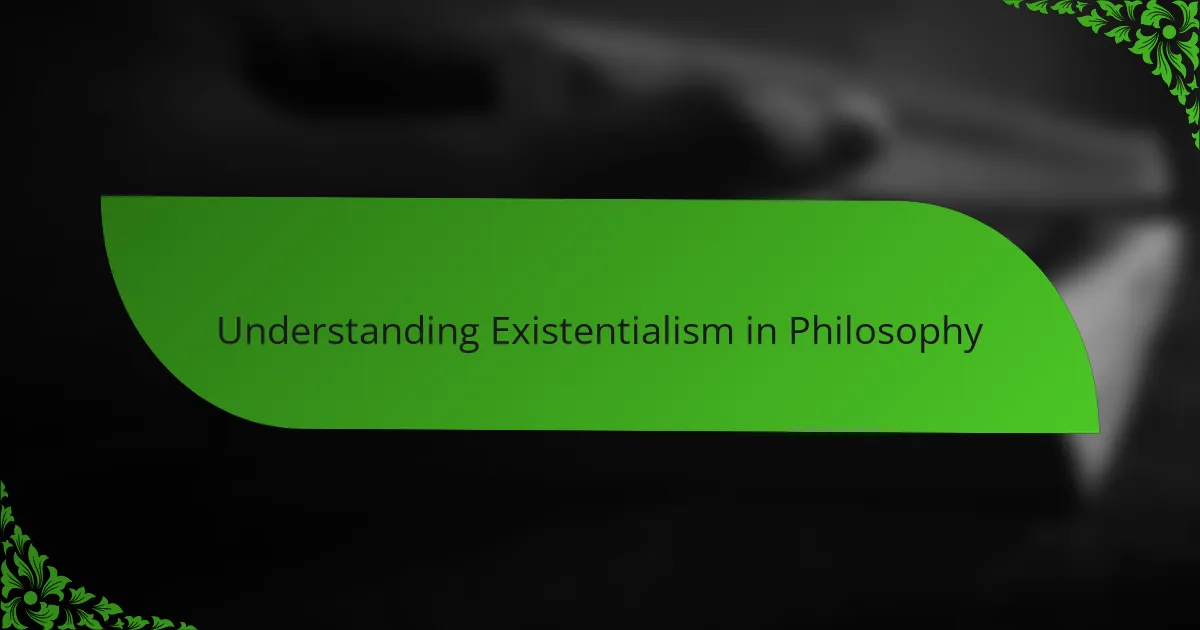
Understanding Existentialism in Philosophy
Existentialism, at its core, challenges us to confront the reality of our own freedom and responsibility. I remember the moment I first grappled with this idea—realizing that life doesn’t come with a predefined purpose hit me both liberatingly and terrifyingly. Have you ever felt that strange mix of excitement and fear when considering that your choices truly shape who you are?
What intrigues me most about existentialism is how it insists on personal experience as the foundation of meaning. It’s not about abstract theories but about the lived reality of making decisions in an uncertain world. This perspective made me question how often I’ve allowed external influences, rather than my own authentic self, to dictate my path.
Understanding existentialism also means accepting that anguish and absurdity are part of the human condition. It’s a philosophy that doesn’t shy away from discomfort but invites us to embrace it as a space for genuine self-discovery. I find this both challenging and oddly comforting—doesn’t it suggest that feeling lost or confused is actually a sign that we’re engaging deeply with our existence?
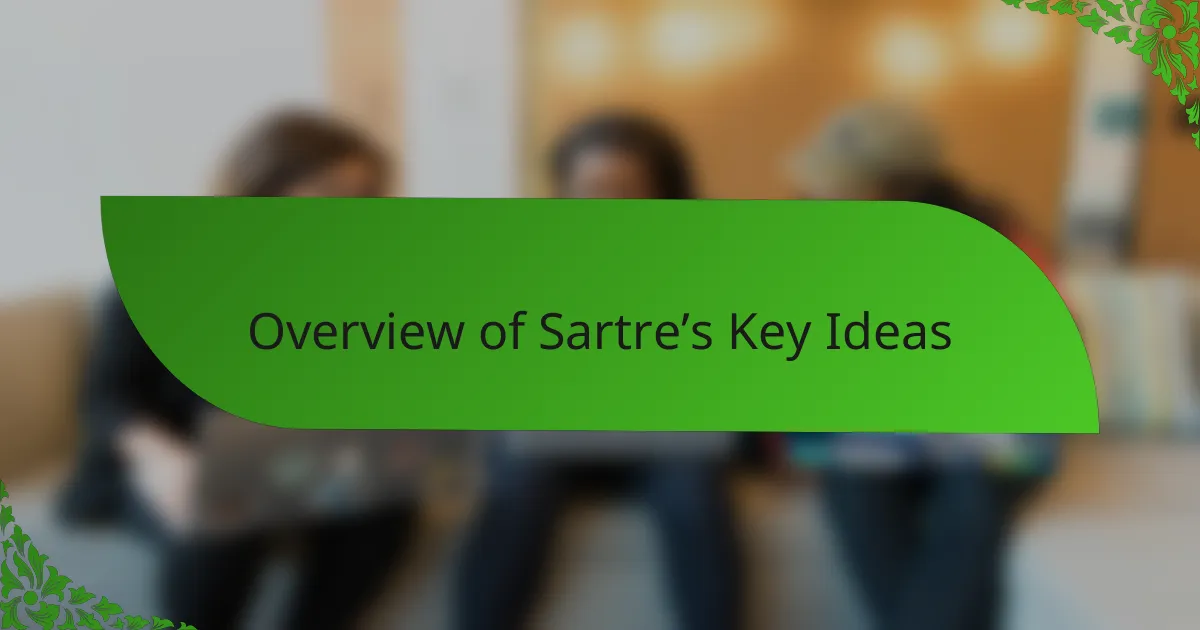
Overview of Sartre’s Key Ideas
Sartre’s existentialism centers on the idea that “existence precedes essence,” meaning we are not born with a predetermined nature or purpose. I recall how this idea shook me—if there’s no script to follow, then every choice I make really counts. Have you ever paused and wondered what it means to be entirely responsible for shaping your own essence?
Another key point is Sartre’s emphasis on radical freedom. This freedom is exhilarating but, honestly, also a bit daunting—I felt that weight when I realized I couldn’t blame circumstances or others for who I become. Isn’t that both empowering and strangely isolating?
Lastly, Sartre talks about “bad faith,” where we deceive ourselves to avoid the anxiety of freedom. I’ve caught myself clinging to roles or excuses just to feel safer, but Sartre challenges us to face the discomfort head-on. Have you ever noticed how easy it is to fall into self-deception, and yet, how freeing it feels to break out of it?
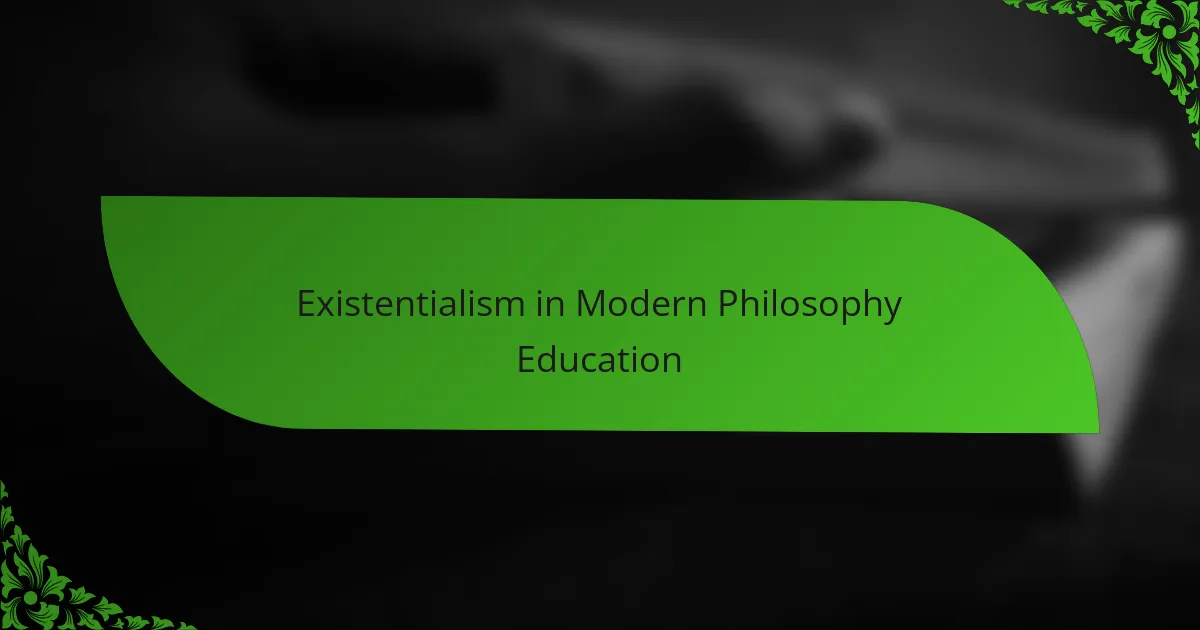
Existentialism in Modern Philosophy Education
Philosophy education today increasingly integrates existentialism to spark students’ critical thinking about their own existence. I’ve seen how introducing Sartre’s ideas can electrify a classroom, turning abstract concepts into personal reflections. Isn’t it powerful when students start questioning not just what philosophy says, but what it means for their own lives?
What strikes me is how existentialism disrupts the traditional, often rigid curriculum. It encourages learners to embrace uncertainty and personal responsibility instead of passively accepting established truths. This shift challenges students—and educators alike—to foster an environment where authentic self-exploration is not only allowed but celebrated.
In my experience, existentialism also makes philosophy education more relatable and urgent. When students realize that their freedom to choose carries real consequences, their engagement deepens. Have you noticed how a subject becomes alive when it speaks directly to the core of human experience? That’s existentialism working its transformative magic in the classroom.
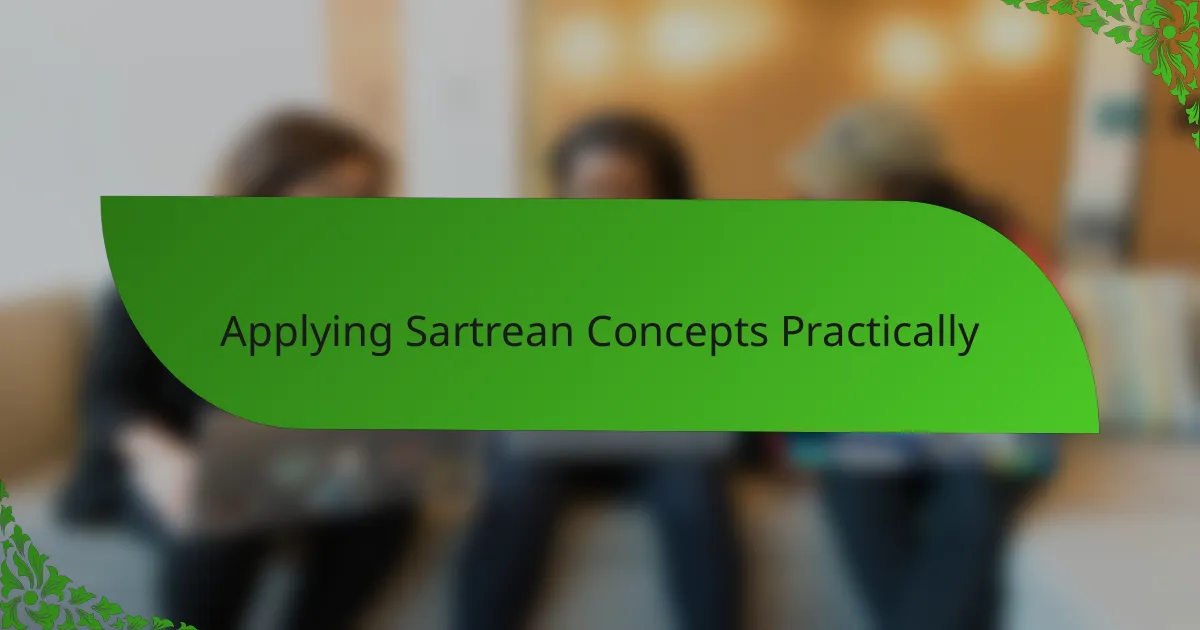
Applying Sartrean Concepts Practically
Bringing Sartre’s ideas into daily life means recognizing that every decision we make truly defines us. I remember once hesitating over a career change, realizing it wasn’t just about the job but about claiming my freedom to create my own identity. Have you ever felt that profound responsibility—and, honestly, a bit of panic—knowing your choices build your essence moment by moment?
Applying Sartre’s concept of “bad faith” in practice is a continual challenge. I’ve caught myself lying to avoid difficult truths about my desires or motives, only to feel trapped by those self-imposed stories. Breaking free from bad faith, though unsettling, opened a pathway to greater authenticity—I think the discomfort signals that we’re finally living honestly with ourselves.
Sartre’s notion of radical freedom also invites us to embrace uncertainty instead of fearing it. When faced with ambiguous situations, I remind myself that there’s no perfect “right” answer laid out—only the freedom to choose and own the outcomes. Isn’t it reassuring, in a strange way, that uncertainty holds the key to genuine autonomy?
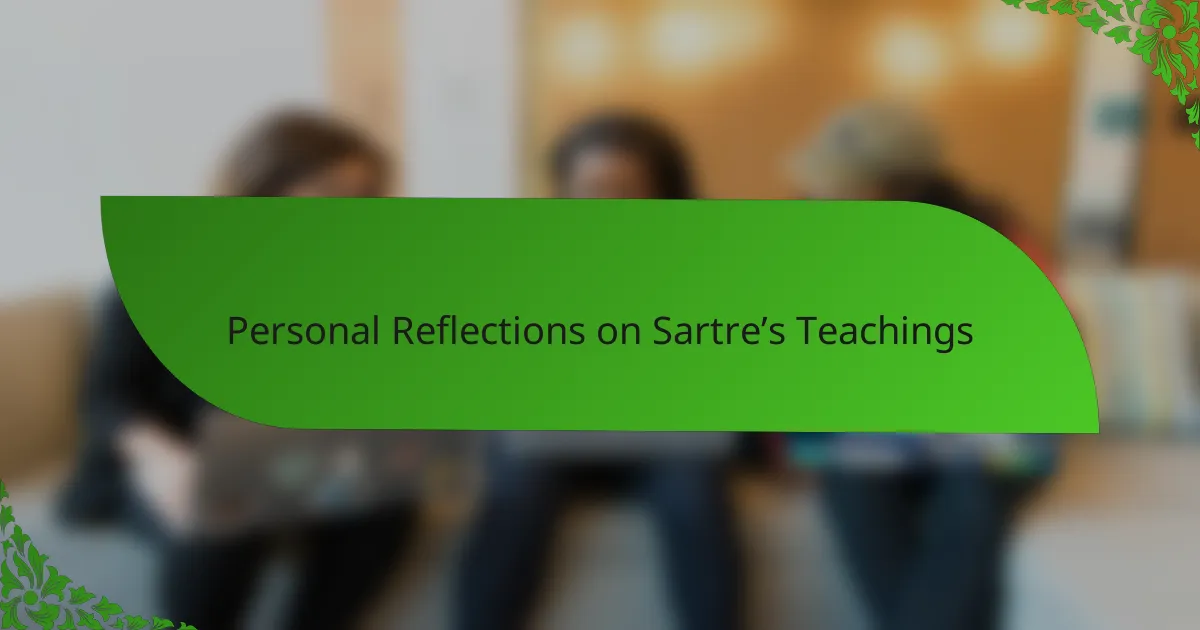
Personal Reflections on Sartre’s Teachings
Sartre’s insistence that we are condemned to be free resonated deeply with me. I recall moments when this felt like a heavy burden—knowing I alone must navigate the crossroads of life without a guide. Have you ever felt simultaneously empowered and overwhelmed by the sheer responsibility of shaping your own existence?
What I find truly compelling is how Sartre doesn’t sugarcoat the anxiety that freedom brings; instead, he calls it a necessary companion to authentic living. I’ve experienced this firsthand when confronting decisions that forced me out of comfort zones, reminding me that growth often comes wrapped in discomfort. Isn’t it fascinating how facing this anxiety can reveal a truer sense of self?
Sartre’s challenge to reject “bad faith” has been an ongoing personal quest. I’ve noticed how easy it is to fall back into self-deception to avoid hard choices, yet breaking free from these illusions feels undeniably liberating. Have you ever had that moment when honesty, though painful, suddenly unlocks a clearer, more meaningful path forward?
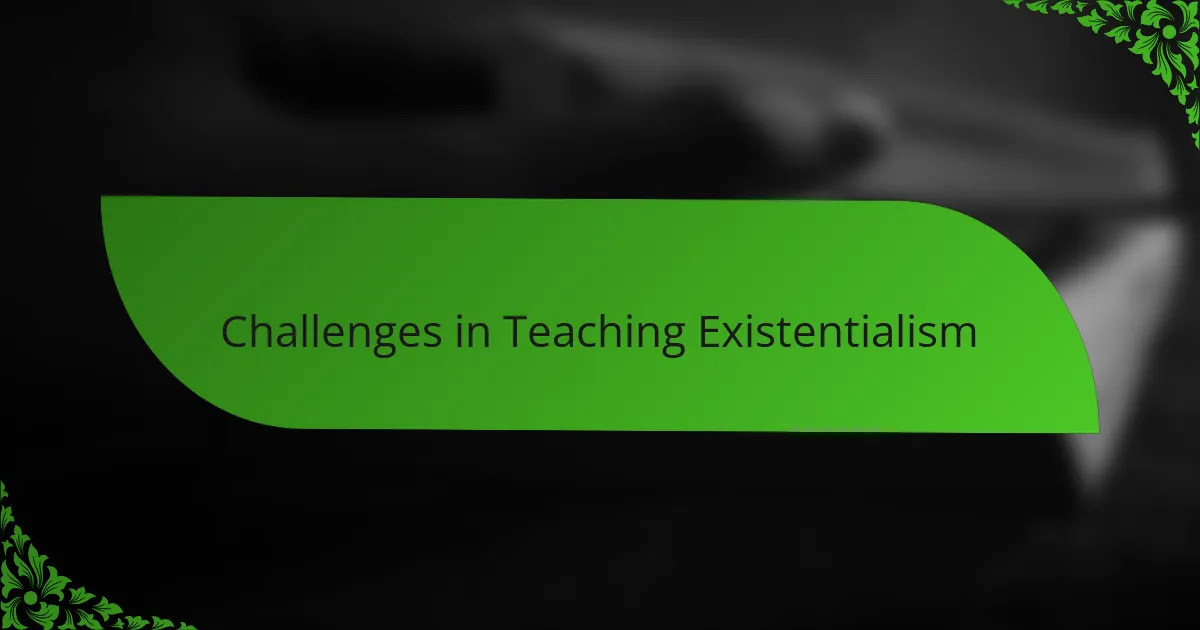
Challenges in Teaching Existentialism
Teaching existentialism isn’t always straightforward. I’ve found that helping students grasp the weight of radical freedom can be a real struggle—when you tell someone they are entirely responsible for creating their essence, it can spark anxiety or even resistance. Have you noticed how this sense of overwhelming choice can sometimes make learners shut down instead of open up?
Another challenge lies in conveying the abstract feeling of “anguish” and “bad faith” without making students uncomfortable or defensive. I recall a class where some students felt exposed when discussing self-deception, almost as if admitting bad faith was shameful, not liberating. How do you create a safe space where confronting these tough emotions becomes an invitation to growth rather than a barrier?
Finally, existentialism’s demand for personal reflection can be daunting in structured education settings. I’ve often wondered—how can educators balance fostering personal meaning-making with curriculum requirements? Encouraging students to embrace uncertainty and discomfort means loosening control, which isn’t always easy for either instructors or learners. Yet, that tension is precisely where deep learning happens.
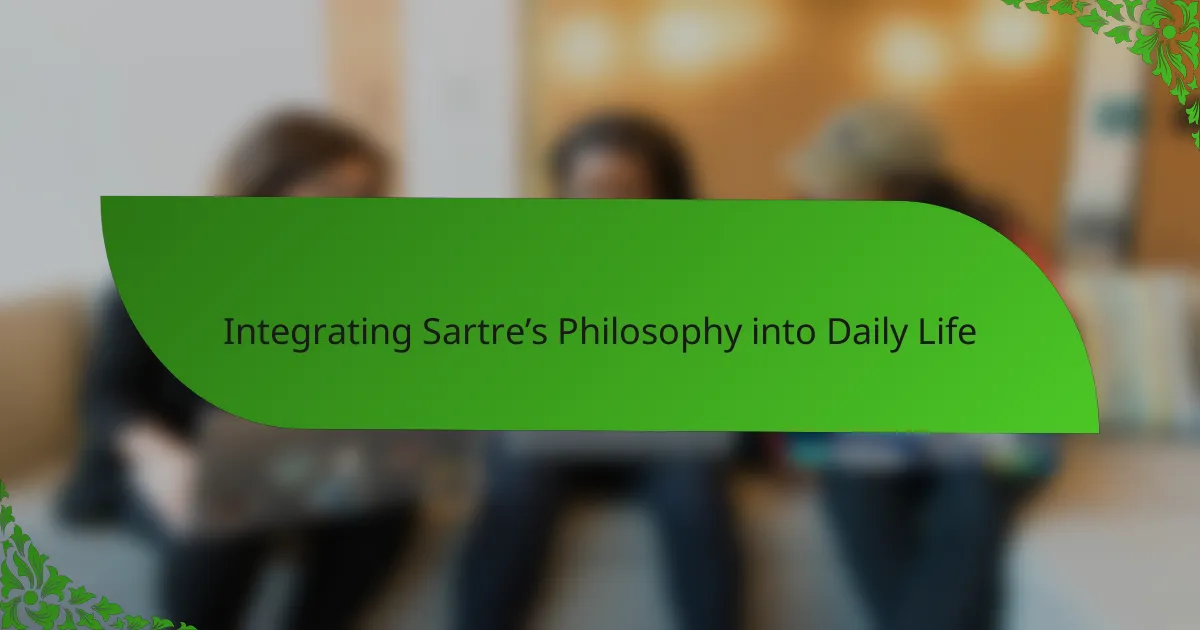
Integrating Sartre’s Philosophy into Daily Life
Integrating Sartre’s philosophy into daily life means embracing the idea that each moment offers a choice that defines who we are. I remember a time when I caught myself stuck in a routine, realizing I was living on autopilot—Sartre’s call to radical freedom pushed me to break that cycle and take ownership of my actions more consciously. Have you ever noticed how simple decisions, like what to say or where to go, suddenly feel charged with meaning when seen through this lens?
Facing the anxiety that comes with such freedom can be tough. I’ve felt the temptation to slip into “bad faith,” making excuses to avoid responsibility, only to find that this self-deception quietly saps my authenticity. Yet, choosing to confront these uncomfortable truths opened a door to living more honestly—not perfectly, but genuinely. Isn’t it remarkable how discomfort becomes a signpost for growth rather than a signal to retreat?
What’s helped me most is treating each day as an opportunity to act “as if” I am the author of my life’s story, even without a predetermined script. This mindset shifts how I approach relationships, work, and even small daily tasks—transforming routine into a practice of freedom. Have you tried seeing your everyday choices as declarations of your freedom, rather than mere obligations? That’s where Sartre’s philosophy truly comes alive.